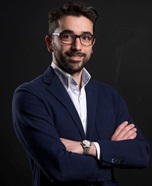
Plenary Lecture
Energy and Resource Recovery from Wastewater: Advanced Technologies and Future Challenges

Professor Vincenzo Naddeo
Sanitary Environmental Engineering Division (SEED)
Department of Civil Engineering
University of Salerno
Italy
E-mail: vnaddeo@unisa.it
Abstract: Worldwide Wastewater Treatment Plants (WWTPs) are generally based on energy-consuming and pollutants removal. In the last decades wastewater is being considered more as a resource than as a waste - a resource for clean water, for plant nutrients, and for energy. Biological technologies, advanced reuse and recycling techniques and progressive green-based practices have led to various economic, environmental and societal benefits that can help reduce costs, conserve energy, sustain the environment, and improve customer service. In contrast of advances of technology today only only few WWTPs are able to recovery significant amount of energy respects their real potentiality. Regarding the nutrients, most of the WWTPs are mainly focused in removing them than in recovering. Energy can be obtained from wastewater's organic as well as from its thermal content. Also, using wastewater’s nitrogen and P nutrients for plant fertilization, rather than wasting them, helps offset the high energy cost of producing synthetic fertilizers. Recently, great attentions have been paid to microbial fuel cells (MFCs) due to their mild operating conditions and using variety of biodegradable substrates as fuel. MFCs are one of the newest technologies to produce energy from different sources of substrates. The generated power in MFC is still too low and researchers are working to improve it for commercial application. Electrochemical processes applied to wastewater can increase the performances of treatments and produce Hydrogen. Hydrogen has the highest energy content compared to conventional fuels and its sole combustion product is water; hence hydrogen is a powerful and clean energy carrier. In this context, the work aims to review conventional and advanced technologies able to recovery of energy, nutrients and water from wastewater. An assessment of the impact of this circular approach on the overall WWTP process, compared to the conventional flowsheet of WWTPs, will be done.
Brief Biography of the Speaker: Vincenzo Naddeo joined the Department of Civil Engineering at University of Salerno in 2006, after earning his MSc degree with honors in Civil Engineering, and his Ph.D. in Civil and Environmental Engineering. From 2014 dr. Naddeo is associate professor in Sanitary Environmental Engineering. He is expert of the European Union from 2007 in the seventh Framework Programme for Research (FP7) first and in Horizon 2020 now. Dr. Naddeo is an expert in advanced physical/chemical treatment processes in general, with research interests in the behavior emerging contaminants and its removal from water and wastewater, and in the development of ultrasound-based processes for removal of organic pollutants, pathogens, and other contaminants from solutions. For the past 5 years, an additional research focus of Dr. Naddeo work has been on environmental odour characterization and control. In addition to the topics noted above, Dr. Naddeo has published research on MBRs, control of fouling in wastewater ultrafiltration, conventional water/wastewater disinfection, monitoring of river water quality, environmental impact assessment (EIA), strategic environmental assessment (SEA) and control of NOM in drinking water. In addition to his research activities, since 2006 is a member of the scientific board of the Ph.D school in Civil Environmental Engineering at University of Salerno, where he has held the position of secretary of the PhD school from 2006 to 2011. He is the coordinator of several research projects and Erasmus agreements. Dr. Naddeo was visiting scientist at different foreign research institution where he collaborated with high-ranking professor; the most significant experiences were developed at: University of Washington (Seattle); Bogaziçi University (Istanbul); University of Philippines (Manila); University of Cairo (Egypt); Indian Istitute of Technology (IIT) of Dheli (India). Dr. Naddeo has published almost hundred refereed publications in ISI journals, congress proceedings and written an international handbook on Odour Impact Assessment (Wiley, 2013); he have 4 patents on water and wastewater treatments and 1 patent on novel electronic nose (e.Nose).